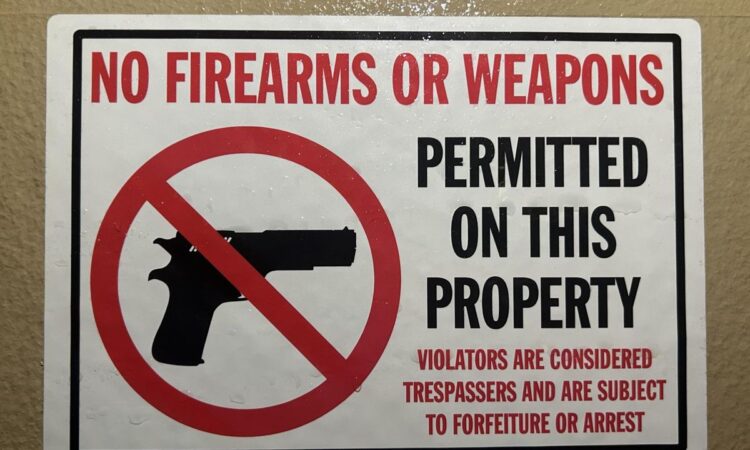
Todd Nepola had always noticed the “no firearms or weapons” signs bolted to the walls of Aventura Mall, but he had never thought to do the same at the 95 retail properties his company, Current Capital Real Estate Group, owns and manages around the state.
Until last month, when his tenants started calling him. That’s when a Florida appeals court struck down the state’s 1987 law banning openly carrying firearms in most public places.
After fielding questions about how retailers should handle people who show up with a gun, Nepola directed Current Capital employees to start posting their own “no firearms” signs on their properties. Nepola said he is consulting attorneys on how to incorporate no-gun clauses in leases going forward.
“I’m just trying to keep our centers family-friendly,” he said. “I want mom and dad to feel safe bringing their 6-year-old and 3-year-old, walking around and not having to see [a firearm]. We don’t have crime that is necessary to have guns to protect yourself, so I would just like to keep it that way.”

Bisnow/Chloe Gallivan
South Florida property managers, owners and tenants are deciding whether to implement gun policies.
Starting Sept. 25, anyone with a legally purchased gun, even semiautomatic rifles like AR-15s, can carry a legally owned gun in plain sight or partially concealed in public spaces.
But the law leaves it up to property owners, managers and tenants of private areas to decide whether they prohibit or restrict firearms on their premises.
That has put the onus on property owners and managers, as well as each individual business, to clarify their stance, either by reinforcing or creating their policies.
“Before, it was like if you didn’t see it, then you didn’t have it, and you didn’t have to be upfront with your policy,” Shutts & Bowen LLP partner Elizabeth Jones said. “Now, the fact that it’s just more visible, it’s sort of forcing some of the businesses to decide, ‘What do you want your policy to be if you don’t have a policy?’
“If you don’t have a policy, one way or the other, you’re permitting open carry,” she added.
Florida banned the ability to openly carry in 1987 but allowed legal gun owners to carry concealed firearms, hidden from public view. In 2023, lawmakers loosened restrictions by allowing concealed carry without having to obtain a government-issued permit or license, which often includes background checks or safety classes.
This year, Florida Gov. Ron DeSantis pushed to entirely repeal the open-carry ban at the beginning of the legislative session in March.
In September, the 1st District Court of Appeal ruled the ban was unconstitutional and gave the state until Sept. 25 to appeal the ruling. Attorney General James Uthmeier declared a few days later that he wouldn’t defend the ban.
Every property or business owner has the right to prohibit or allow weapons on their property, which was also the case with concealed carry.
The only exception is that property owners can’t prohibit a legal carrier, someone over the age of 21 and not a felon, from having a locked firearm in their vehicle, even if in the parking lot where it is banned, Jones said.
Property owners, managers and tenants may be reluctant to jump on a policy decision to ban weapons in a state second only to Texas in the estimated number of adults living in homes with firearms. Multiple property managers expressed to Bisnow that gun ownership and concealed carry are popular among the state’s residents.
Some are waiting to see the public response to possible open-carry confrontations before publicizing or writing a policy. Many are deciding not to, at least not yet.
“You may be banning half of your customers,” said Kevin Logue, a property manager and chair of the Institute of Real Estate Management’s Advocacy Committee. “If you’re in a business, you have to consider that and weigh the pros and cons.”
The largest supermarket chain in Florida, Publix, allows customers to openly carry a firearm in its more than 800 Sunshine State stores, Publix Media Relations Manager for Central and South Florida Lindsey Willis confirmed to Bisnow.
“In any instance where a customer creates a threatening, erratic or dangerous shopping experience — whether they are openly carrying a firearm or not — we will engage local law enforcement to protect our customers and associates,” Willis wrote in an email.
The second-largest supermarket chain, Winn-Dixie, which has 340 stores in Florida, prohibits firearms, as does Target, spokespeople for the companies confirmed. Home Depot allows open and concealed carry in its Florida stores, a spokesperson confirmed.
Walmart and Aldi authorize concealed carry in their Florida stores. The companies didn’t respond to a request for comment.

Bisnow/Chloe Gallivan
Publix is one of few Florida retailers that allow customers to openly carry firearms.
Logue said that while he hasn’t gotten any reports of a gun-related incident at the properties he supervises, his daughter, who works at a fast-casual restaurant, witnessed the new legal reality firsthand when a customer entered her shop and flashed their firearm, asking for the store policy.
“Those types of things, you may see,” said Logue, who is vice president and director of property management at Orlando-based Equity Investment Services. “I gave her the same advice … discuss it with the owner, and they can decide if they want to put a sign up.”
But there is little formal guidance about best practices for property managers, and many small-business tenants look to them to set policies, as opposed to the Publix- and Winn-Dixie-sized companies with legal teams.
Bisnow reached out to more than 25 property managers and owners. Out of 16 of South Florida’s largest commercial property management firms by square footage managed, only one agreed to speak on the record about the issue.
Jeremy Larkin, CEO of NAI Miami, Fort Lauderdale, told Bisnow his firm hasn’t established a formal blanket policy for the more than 80 properties it manages in South Florida, opting to wait and see how the situation plays out.
“Based on the behavior of the public, is it necessary?” he said.
But some aren’t so willing to take the chance.
Within 24 hours of the law’s implementation, NDM Hospitality started updating signage at the retail districts it manages, like Miami Worldcenter and Plantation Walk, clarifying that its “no weapons policy” also specifically applied to open carry.
“Anytime major legislation is passed, we want to make sure that we’re up to speed [and] our team is up to speed on the latest and … on how to handle situations,” NDM Hospitality and Rentyl Resorts CEO Nick Falcone said. “Then we’re really out in front. We don’t want to be reactive — we want to be proactive.”
The family-owned business is also retraining staff to handle any situation where a gun on the property is involved — which could entail getting on-site security involved or calling law enforcement immediately, Falcone said.
“Many people, just if they see a gun, they’re going to be extremely afraid,” Falcone said.
Even as images of citizens walking through malls with rifles in hand or riding down the highway with a long gun strapped to their back circulate the internet, none of the property managers who spoke to Bisnow had heard of a gun-related incident at their properties since open carry took effect.
But if it does, it isn’t always clear who is liable, said Jones, a West Palm Beach-based partner in Shutts & Bowen’s real estate practice.
“Premises liability is a very complicated area of law,” she said in an email.
A victim of a shooting with a creative lawyer could argue that a property owner’s decision to allow open carry makes it liable, though it is unclear how courts would rule on it, she said. But if an owner prohibits firearms and fails to enforce the policy, that could also leave it exposed.
“I think we don’t think about some of the things that we vote on … until after the fact,” Nepola said. “But so far, so good. It hasn’t been an issue, and I’ll keep my fingers crossed that it stays that way and it works out just fine. That’s all we can hope for.”






